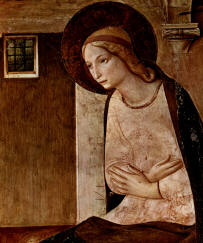A few days after the feast of Our Lady of Lourdes, the Holy Father began to make more specific applications of the mystery of Mary to various aspects of ecclesial life. The first to be addressed was the "liturgical" aspect, or that of prayer, which is an extension and prolongation of the sacrificial prayer of Jesus on Calvary and in the Eucharist, the only prayer acceptable to and accepted by the Father. The entire weekly catechesis for 15 February, 2006, dealt with the Canticle of Mary, the Magnificat The Holy Father notes that this hymn of Mary is the culmination of our liturgy every day, of the Divine Office, hut above all of the Mass, and let us hope, of that "liturgy" which our lives should have been when they end in a holy death. In effect, from the Pope to the humblest member of the Church, no prayer is heard unless it be mediated by Mary, so that with Her Magnificat it might be one with the sacrifice of Jesus.
Here are a few of the many profound insights found in this brief but inspiring instruction, which surely bears evidence of the silent support of the Authoress in its composition.
"Let us therefore accept the invitation that St. Ambrose, the great Doctor of the Church, ad dresses to us in his commentary on the text of the Magnificat 'May Mary's soul be in each one to magnify the Lord, may Mary's spirit be in each one to rejoice in God; if, according to the flesh, the Mother of Christ is one alone, according to the faith all souls bring forth Christ; each, in fact, welcomes the Word of God with in... Mary's soul magnifies the Lord and her spirit rejoices in God because, consecrated in soul and spirit to the Father and to the Son, she adores with devout affection the one God, from whom come all things, and the one Lord, for the sake of whom all things exist' (Exposition of the Holy Gospel according to Saint Luke, 2:26-27).
"In this marvelous commentary on the Magnificat by St. Ambrose, I am always especially moved by the surprising words:
"If, according to the flesh the Mother of Christ is one alone, according to the faith all souls bring forth Christ: indeed, each one intimately welcomes the Word of God." Thus, interpreting Our Lady's very words, the Holy Doctor invites us to ensure that the Lord can find a dwelling place in our own souls and lives. Not only must we carry him in our hearts, but we must bring him to the world, so that we too can bring forth Christ for our epoch.
Let us pray the Lord to help us praise him with Mary's spirit and soul, and to bring Christ back to our world."
We meet the same thought in the first letter of St. Francis of Assisi to the faithful, where he says that when we make ourselves ex tensions of the maternal Mediatrix of all graces, by our holy lives and missionary zeal we not only bring, but beget Jesus in the minds and hearts of those who believe through us.


